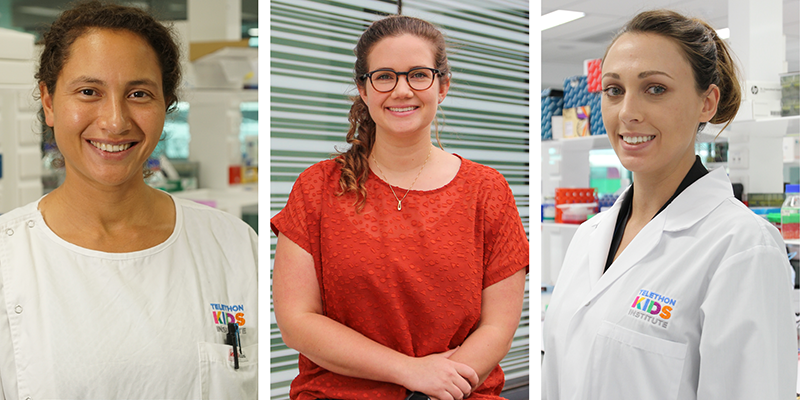Search
Showing results for "Au"

News & Events
Raine Foundation grants to support key child health researchThree outstanding young researchers from The Kids Research Institute Australia have been named Raine Fellows and received valuable Raine Priming Grants to support their child health research.

News & Events
Families flock outdoors to find COVID silver liningA The Kids Research Institute Australia study which looked at how Western Australian families coped with COVID-19 restrictions has shown many parents managed to find the silver lining in WA’s lockdown last year.

News & Events
Jake's diabetes journeyJake's diabetes journey Age when diagnosed; two years-old, almost three.
Research
A process and impact evaluation of use of a Powered Wheelchair Standing Device by boys with Duchenne muscular dystrophyGraham Jenny Peter Hall Downs Jacoby BAppSci PhD CRFS FANZSRS FThorSoc FERS BApplSci (physio) MSc PhD BA (Hons) MSc Honorary Research Associate Head,
Research
Developing and characterising juvenile models of aggressive paediatric brain cancers for the evaluation of novel immunotherapiesNick Raelene Terrance Gottardo Endersby Johns MBChB FRACP PhD BSc (Hons) PhD Head of Paediatric and Adolescent Oncology and Haematology, Perth
Research
Educational Outcomes of Children in Contact with the Child Protection System: A Longitudinal Population StudyMelissa Fiona Helen O'Donnell Stanley Leonard BPsych (Hons), MPsych, GradDip Ed, PhD FAA FASSA MSc MD FFPHM FAFPHM FRACP FRANZCOG HonDSc HonDUniv
Research
International Rett syndrome study: InterRettHelen Jenny Leonard Downs MBChB MPH BApplSci (physio) MSc PhD Principal Research Fellow Head, Child Disability +61 419 956 946 08 6319 1763
Research
Standardization of Epidemiological Surveillance of Acute Poststreptococcal GlomerulonephritisAcute poststreptococcal glomerulonephritis (APSGN) is an immune complex-induced glomerulonephritis that develops as a sequela of streptococcal infections. This article provides guidelines for the surveillance of APSGN due to group A Streptococcus (Strep A). The primary objectives of APSGN surveillance are to monitor trends in age- and sex-specific incidence, describe the demographic and clinical characteristics of patients with APSGN, document accompanying risk factors, then monitor trends in frequency of complications, illness duration, hospitalization rates, and mortality.
Research
Penicillin G concentrations required for prophylaxis against Group A Streptococcus infection evaluated using a hollow fibre model and mathematical modellingAcute rheumatic fever (ARF), an autoimmune reaction to Group A Streptococcus (Streptococcus pyogenes; Strep A) infection, can cause rheumatic heart disease (RHD). New formulations of long-acting penicillins are being developed for secondary prophylaxis of ARF and RHD.
Research
Implementation Fidelity of a Smartphone Application for Population-Based General Movement Assessment: The Early Moves StudyTo describe the infant and maternal characteristics of the Early Moves cohort and to assess representativeness to the general population, and to evaluate the implementation fidelity of an application-based collection of General Movement Assessment (GMA) videos at writhing and fidgety age.
